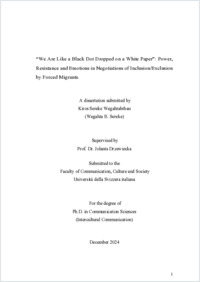“We are like a black dot dropped on a white paper” : power, resistance and emotions in negotiations of inclusion/exclusion by forced migrants
- Wegahtabrhan, Kiros Sereke
- Drzewiecka, Jolanta (Degree supervisor)
- 2024
PhD: Università della Svizzera italiana
Affect and emotion regulation
Affective-discursive practices discursive resistance
Forced migrants
Power dynamics and relational integration
Productive discomfort
Racial exclusion
Tactics and strategies
English
The dissertation advances the understanding of integration as a power struggle between "insiders" and "outsiders" (Klarenbeek, 2021, 2024) by examining how Eritreans who arrived in Switzerland as forced migrants (EFMs) negotiate inclusions and exclusions through everyday practices, verbal resistance against racism, and emotions and their regulation. It elucidates the multidimensionality of power struggles in integration based on three theoretical frameworks: practices of everyday life (de Certeau, 1984), reversal discourse (Foucault, 1990), and affective-discursive practices (Wetherell, 2012). The project engages with both European migrant integration studies and critical intercultural communication studies to advance research on black migrants 'experiences in Switzerland and, more broadly, in Europe (Hawthorne, 2023; Rastas & Nikunen, 2019; Small, 2018). The dissertation makes four key conceptual contributions to the understanding of integration as a relational power laden process. First, it demonstrates the complexity of forced migrants' everyday practices of negotiating structures of exclusions and power relations in interpersonal and institutional settings. It shows that while their ability to use tactical and strategic forms of power is constrained, it is not limited to their subjectivity. The dissertation moves away from the predominant applications of de Certeau's (1984) schema of tactics and strategies as a binary and demonstrates that the two form a continuum whereby practices can have tactical and strategic elements. It also identifies a novel form of strategy deployed by proxy. Second, it examines the complex communicative dynamics of reverse discourse in response to everyday racism as dispersed resistance. It identifies five novel types of discursive reversals (Foucault, 1990) animated by affect through which migrants challenge and renegotiate relationships shaped by racial hierarchies, thereby altering the dynamics of these interactions. Third, the dissertation advances the understanding of emotion as central to integration and offers insights into how emotions are managed to negotiate cultural differences and systemic and structural exclusions. It develops the concept of "intercultural extrinsic emotion regulation" to explain how the EFMs attempted to regulate each other's emotions based on their interpretations of and investments in racial hierarchies. Fourth, the dissertation offers methodological insights into the capacity of discomfort to generate understanding in the context of studying refugees by a researcher who is herself a refugee. The dissertation draws on 65 in-depth semi-structured interviews and eleven publicly available YouTube recordings of Zoom meetings of the EFMs.
- Collections
- Language
-
- English
- Classification
- Social sciences
- License
- License undefined
- Open access status
- green
- Identifiers
-
- NDP-USI 2024COM010
- ARK ark:/12658/srd1330625
- URN urn:nbn:ch:rero-006-122563
- Persistent URL
- https://n2t.net/ark:/12658/srd1330625
Statistics
Document views: 67
File downloads:
- 2024COM010.pdf: 165
